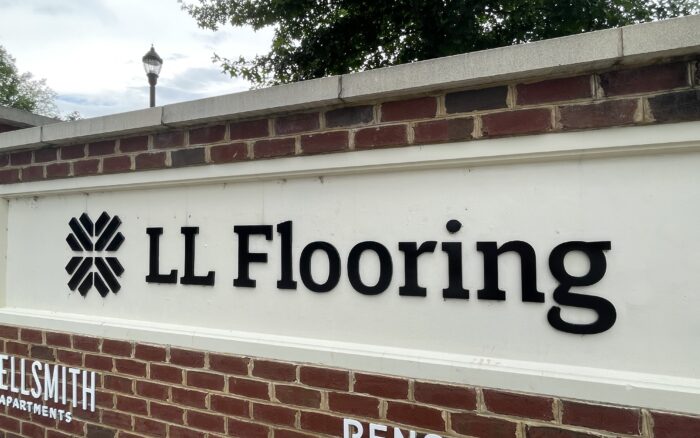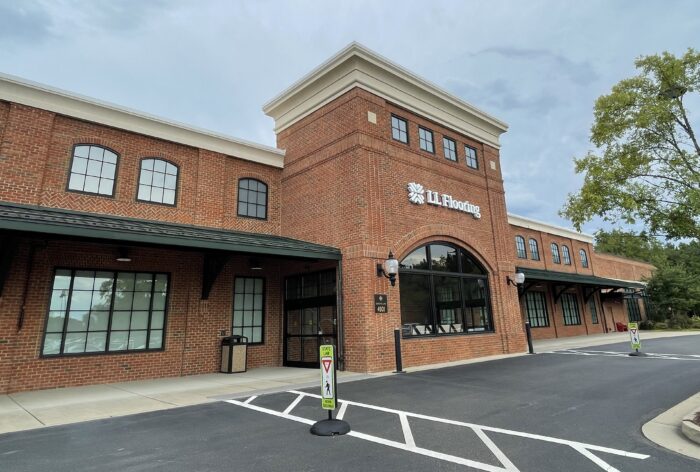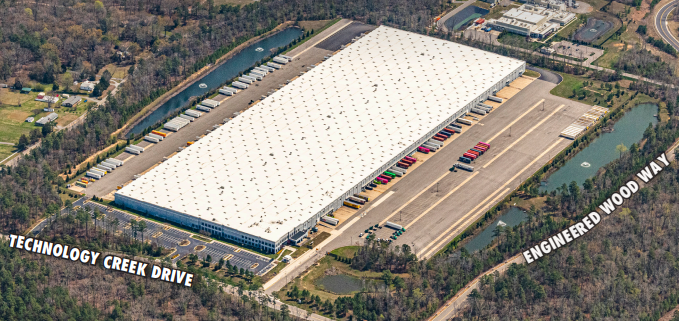LL Flooring, the Henrico-based flooring retailer formerly known as Lumber Liquidators, has fallen into bankruptcy.
The company on Monday announced it had filed for Chapter 11 bankruptcy protection as it is short on cash and looking to unload its business assets in what it described as a “going-concern sale.”
It said it is in negotiations with multiple bidders and hopes to gain court approval for a sale in the next few weeks.
In the interim, the company’s nearly 400 stores remain open for business; however, 94 of those are set to close next month. Only one of those stores is in Virginia – an outpost in Woodbridge.
CEO Charles Tyson, in a prepared statement issued in conjunction with the Chapter 11 filing, said: “Today’s step is intended to provide LL Flooring with additional time and financial flexibility as we reduce our physical footprint and close certain stores while pursuing a going-concern sale of the rest of our business. As we move through this process, we are committed to continuing to serve our valued customers, and to working seamlessly with our vendors and partners. I am appreciative of our associates for their ongoing hard work in providing the best experience for our customers.”
The Chapter 11 filing, which was made late Sunday in federal bankruptcy court in Delaware, ends months of uncertainty for the publicly traded company.
Its stock has been on a steady decline as the company turned down several offers over the last two years from prospective buyers. Earlier this year it revealed in its earnings statements that its ability to continue to operate was unclear due to a shortage of cash and a tightened borrowing ability.
The company explained in its bankruptcy filings that a combination of economic factors contributed to its recent decline.
“The company has been historically successful; however… given a changing market characterized by lower levels of home improvements, depressed discretionary spending, and the subsiding of the COVID-19 demand bubble for home renovation projects, LL Flooring has suffered multiple setbacks, ultimately constraining its liquidity to unsustainable levels and leading the company to commence these Chapter 11 cases.”
The filings state that LL has total assets of $501 million, total debts of $416 million and only $8 million of cash on hand with which to operate.
LL Flooring was founded in New England as Lumber Liquidators in 1994 by Thomas Sullivan. It went public in 2007 after being owned by a private equity firm and relocated its corporate headquarters to Toano, Virginia.
It again moved its home base several years ago to 4901 Bakers Mill Lane in Libbie Mill in Henrico.
Some of the company’s troubles began in 2015, when it was the subject of a damning “60 Minutes” exposé related to claims of unsafe levels of formaldehyde in flooring it had imported from China. It also pleaded guilty in 2015 to federal environmental crimes related to its imports from the Russian Far East.
Those episodes harmed its reputation to the point that it sought to rebrand. The result was the LL Flooring brand, which was unveiled in 2022; however, the company said that name has been slow to catch on.
“Low brand awareness following the rebranding has been a limiting factor in driving sales, further exasperating the company’s recent financial difficulties,” it said in its bankruptcy filings.
It’s also been affected recently by costly tariffs on its imported materials and a hold-up in its ability to import materials during forced labor concerns in the Uyghur region of China, where it sources some of its products.
That all has led to increasingly worsening earnings and a precipitous decline in the company’s stock, which trades on the New York Stock Exchange under the symbol LL. It posted a loss of nearly $29 million in the first quarter of this year, on top of an annual loss of $103 million in 2023. Its shares have been trading below $1 per share since mid-July and closed Monday at $0.84 per share. That puts its market cap at $25 million.
The company’s shares peaked in 2013 at around $119 per share.
Sullivan, who left the company more than a decade ago, remains its largest shareholder through his firm F9 Investments. That company owns nearly 9 percent of LL Flooring stock. F9 is also a landlord on dozens of LL retail locations.
Sullivan attempted to acquire control of the company over the last year but was rebuffed by its current leadership. He successfully gained a seat on the LL board of directors last month, only to resign in conjunction with the Chapter 11 filing.
What the potential bankruptcy sale means for the company’s 2,000 employees and its local headquarters isn’t totally clear. The company said 71 percent of its workers are in its retail stores.
Among the assets it is looking to sell is a 1 million-square-foot distribution center in Sandston. It had listed that property earlier this year in an attempt to drum up extra cash, but has yet to close on any deal. The company said it is in discussions with a buyer to sell the property for $100 million. Commercial real estate brokerage JLL has handled that listing.
The company also said that if a sale of the business as a whole doesn’t come to fruition, it will look to liquidate.
LL is represented in the Chapter 11 case by attorneys from law firm giant Skadden and financial advisor AlixPartners.
Several related entities each filed simultaneously, including the publicly traded parent company LL Flooring Holdings, LL Flooring Inc., Lumber Liquidators Leasing, LL Flooring Services, Lumber Liquidators Foreign Holdings.
LL Flooring, the Henrico-based flooring retailer formerly known as Lumber Liquidators, has fallen into bankruptcy.
The company on Monday announced it had filed for Chapter 11 bankruptcy protection as it is short on cash and looking to unload its business assets in what it described as a “going-concern sale.”
It said it is in negotiations with multiple bidders and hopes to gain court approval for a sale in the next few weeks.
In the interim, the company’s nearly 400 stores remain open for business; however, 94 of those are set to close next month. Only one of those stores is in Virginia – an outpost in Woodbridge.
CEO Charles Tyson, in a prepared statement issued in conjunction with the Chapter 11 filing, said: “Today’s step is intended to provide LL Flooring with additional time and financial flexibility as we reduce our physical footprint and close certain stores while pursuing a going-concern sale of the rest of our business. As we move through this process, we are committed to continuing to serve our valued customers, and to working seamlessly with our vendors and partners. I am appreciative of our associates for their ongoing hard work in providing the best experience for our customers.”
The Chapter 11 filing, which was made late Sunday in federal bankruptcy court in Delaware, ends months of uncertainty for the publicly traded company.
Its stock has been on a steady decline as the company turned down several offers over the last two years from prospective buyers. Earlier this year it revealed in its earnings statements that its ability to continue to operate was unclear due to a shortage of cash and a tightened borrowing ability.
The company explained in its bankruptcy filings that a combination of economic factors contributed to its recent decline.
“The company has been historically successful; however… given a changing market characterized by lower levels of home improvements, depressed discretionary spending, and the subsiding of the COVID-19 demand bubble for home renovation projects, LL Flooring has suffered multiple setbacks, ultimately constraining its liquidity to unsustainable levels and leading the company to commence these Chapter 11 cases.”
The filings state that LL has total assets of $501 million, total debts of $416 million and only $8 million of cash on hand with which to operate.
LL Flooring was founded in New England as Lumber Liquidators in 1994 by Thomas Sullivan. It went public in 2007 after being owned by a private equity firm and relocated its corporate headquarters to Toano, Virginia.
It again moved its home base several years ago to 4901 Bakers Mill Lane in Libbie Mill in Henrico.
Some of the company’s troubles began in 2015, when it was the subject of a damning “60 Minutes” exposé related to claims of unsafe levels of formaldehyde in flooring it had imported from China. It also pleaded guilty in 2015 to federal environmental crimes related to its imports from the Russian Far East.
Those episodes harmed its reputation to the point that it sought to rebrand. The result was the LL Flooring brand, which was unveiled in 2022; however, the company said that name has been slow to catch on.
“Low brand awareness following the rebranding has been a limiting factor in driving sales, further exasperating the company’s recent financial difficulties,” it said in its bankruptcy filings.
It’s also been affected recently by costly tariffs on its imported materials and a hold-up in its ability to import materials during forced labor concerns in the Uyghur region of China, where it sources some of its products.
That all has led to increasingly worsening earnings and a precipitous decline in the company’s stock, which trades on the New York Stock Exchange under the symbol LL. It posted a loss of nearly $29 million in the first quarter of this year, on top of an annual loss of $103 million in 2023. Its shares have been trading below $1 per share since mid-July and closed Monday at $0.84 per share. That puts its market cap at $25 million.
The company’s shares peaked in 2013 at around $119 per share.
Sullivan, who left the company more than a decade ago, remains its largest shareholder through his firm F9 Investments. That company owns nearly 9 percent of LL Flooring stock. F9 is also a landlord on dozens of LL retail locations.
Sullivan attempted to acquire control of the company over the last year but was rebuffed by its current leadership. He successfully gained a seat on the LL board of directors last month, only to resign in conjunction with the Chapter 11 filing.
What the potential bankruptcy sale means for the company’s 2,000 employees and its local headquarters isn’t totally clear. The company said 71 percent of its workers are in its retail stores.
Among the assets it is looking to sell is a 1 million-square-foot distribution center in Sandston. It had listed that property earlier this year in an attempt to drum up extra cash, but has yet to close on any deal. The company said it is in discussions with a buyer to sell the property for $100 million. Commercial real estate brokerage JLL has handled that listing.
The company also said that if a sale of the business as a whole doesn’t come to fruition, it will look to liquidate.
LL is represented in the Chapter 11 case by attorneys from law firm giant Skadden and financial advisor AlixPartners.
Several related entities each filed simultaneously, including the publicly traded parent company LL Flooring Holdings, LL Flooring Inc., Lumber Liquidators Leasing, LL Flooring Services, Lumber Liquidators Foreign Holdings.






That’s a bad luck building in Libbie Mill. The last tenant also went out of business.
Skadden will have billed more than the Company’s entire market cap once the dust has settled on the Chapter 11 case.
Dust settles on CH11?? I would say look for a refiling in 30-60 days to CH7. Why would you buy the warehouse to rent to tenant that is going under and not wait for them to be gone. The writing has been on the wall for 4-5 years LL is dead. If they loose $29M a quarter and only have $8M in cash and lenders have stopped allowing them to borrow, they are out on cash in 30 days probably just paying salaries and suppliers.